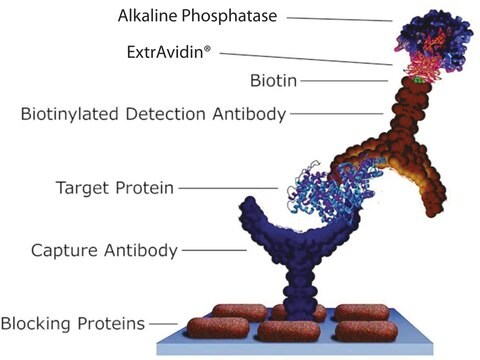411543
Mouse Anti-Human IgG₁, Fc Fragment Specific (HP6069) Biotin Conjugate
liquid, clone HP6069, Calbiochem®
About This Item
Recommended Products
biological source
mouse
Quality Level
antibody form
purified antibody
antibody product type
secondary antibodies
clone
HP6069, monoclonal
form
liquid
does not contain
preservative
manufacturer/tradename
Calbiochem®
storage condition
OK to freeze
avoid repeated freeze/thaw cycles
isotype
IgG
shipped in
ambient
storage temp.
−20°C
target post-translational modification
unmodified
Related Categories
General description
Application
Packaging
Warning
Other Notes
Cross-reactivity by ELISA against human myeloma proteins:
Human IgG1: 100%
Human IgG2: ≤0.1%
Human IgG3: ≤0.2%
Human IgG4: ≤0.1%
Human IgM: ≤0.1%
Human IgA: ≤0.1%
Human IgE: ≤0.1%
Cross-reactivity by ELISA against chimeric antibodies:
Human IgG1: 100%
Human IgG2: <0.02%
Human IgG3: <0.02%
Human IgG4: <0.02%
Human IgM: <0.02%
Human IgA: <0.01%
Human IgE: <0.001%
Legal Information
Not finding the right product?
Try our Product Selector Tool.
Storage Class Code
10 - Combustible liquids
WGK
WGK 1
Flash Point(F)
Not applicable
Flash Point(C)
Not applicable
Regulatory Listings
Regulatory Listings are mainly provided for chemical products. Only limited information can be provided here for non-chemical products. No entry means none of the components are listed. It is the user’s obligation to ensure the safe and legal use of the product.
JAN Code
411543-200UG:
411543-UG:
Certificates of Analysis (COA)
Search for Certificates of Analysis (COA) by entering the products Lot/Batch Number. Lot and Batch Numbers can be found on a product’s label following the words ‘Lot’ or ‘Batch’.
Already Own This Product?
Find documentation for the products that you have recently purchased in the Document Library.
Our team of scientists has experience in all areas of research including Life Science, Material Science, Chemical Synthesis, Chromatography, Analytical and many others.
Contact Technical Service








